Much has been said of this ancient story beginning by reminiscing, showing that living beings have been looking to the past even farther than we know. It is unknown when Asa lived, but it was before this story was recorded.

Mayowa by Jarhed
The tablet goes on to speak of Asa, describing her might, beauty, and heritage as the daughter of the Goddess of Magic herself,
Mayowa.
What it also shows is that Asa has little care for what her actions do to her subjects. She infringes on their privacy, safety, and happiness as often as she pleases to do anything that she wants.
Still, Mayowa doted on her daughter, even as the people pleaded for someone to stop Asa. Of this, Mayowa says:
"Does one seek to stop the mighty sun from setting,
Or the wide rivers from flowing to their end?
Does one wish for an end to the air we breathe?
If not, then stop not my daughter,
For she is all these wonders wrapped in one."— Mayowa, She Who Lingered in the Void
Still, the citizens demanded something be done. They went above Asa and above Mayowa to the remainder of the Gods, begging for help.
It was
Izanagi, King of the Gods and Lord of the Sun, that finally stepped in to stop Asa from terrorizing the people, wishing to show her a lesson of what a ruler truly is.

Izanagi by Jarhed
To the citizens, he responded:
"If there are none to stand against her,
It will take the might of the sun
And all of natures wonders
To put her in her place.
If Mayowa thinks the girl
Is like the beauties of nature,
Let her see nature's beasts and horrors
Which cannot be stopped by even I."— Izanagi, She Who Lingered in the Void
Izanagi ripped a piece of his own sun off of the celestial body, fashioning it into the body of a Giant. He threw her to the ground, where she is said to have landed in what would become the Ironforge Volcano.
This new creation was the combination of the sun and all the terrors of nature: its beasts, violence, filth, and repulsiveness. She was named Solfrid as a mockery, as it stood for the sun, but also beauty, and Izanagi did not believe there was any beauty in this creature.
"Fire flowed from her mangled mane,
While fangs upset the rhythm of her crooked teeth.
Her stare, they say, could make a God cry,
And her strength was unmatched from Heaven to Hell."— She Who Lingered in the Void

Solfrid (as depicted by Maldur Gludenn) by Jarhed
Solfrid sought out Asa. Asa, hearing of the creature, tried many attempts at stopping her. All the warriors she sent were torn apart and every other plan fell apart.
The most successful attempt was a hunter named Baggi. Baggi, who connected with nature, managed to help Solfrid understand the civilization of Giants, bringing her into the Kingdom behind Asa's back.
Asa, meanwhile, dreams of companionship. Never had there been anyone but her mother that was able to stand by her side, so this dream was unbelievable to her. Still, she asked Mayowa to interpret the dream, and Mayowa said that it had to come true. There would be someone to stand with Asa soon.
It is said that Baggi seduced Solfrid as well. The exact section where this may have happened is lost on the tablets, so it is unclear.
Tablet Two
What is clear is that Baggi told Solfrid of what Asa had done, and Solfrid could not be controlled afterwards.
She ran to Asa, demanding a battle. This clash between the two Giants no longer remains either, and by its end, the two had become friends.
More than that, Asa said of Solfrid:
"Never have I seen one whose beauty leaves me stunned,
Nor have I met one with passion as enrapturing
As she, the one before me now.
I was not complete until I laid eyes on her,
And now my heart and soul are captured."— Asa, She Who Lingered in the Void
Where the Gods had seen only an ugly creature that they threw onto the world to rid themselves of, Asa saw the most beautiful person she had ever met standing before her. Someone that nearly immediately made Asa consider that she, too, was not so high and mighty. If someone considered a beast on the inside could be so beautiful, could she, so beautiful on the outside, be a beast inside?
Asa then suggests to Solfrid that they go hunting, and Solfrid agrees, both because she loved to hunt before as a beast, but also because she had learned from Baggi the ways that Giants hunt.
Tablet Three
The next tablet has Izanagi reluctantly grant the two women protection in their hunt, and Mayowa performs a ritual marriage for Asa and Solfrid. The ritual itself is not expanded upon, but the vows the two take are, as Asa says:
"You, who are my only companion
In this dark world for all eternity,
Shall be the only one for whom I raise my blade
And the only reason that I sheathe it.
You, who are unmatched, if not for me,
In all ways. Be it beauty, strength, or wit,
Only I can be your equal,
And only you are mine.
I swear on this setting sun,
And the one that shall rise in its wake,
I swear on the crops in the field,
Alongside every creature that grazes on the grass,
To hold you in my heart
And care for only you."— Asa, She Who Lingered in the Void
Some versions of the tale call this the first marriage, but it is ultimately unimportant if it is or is not. The meaning of the scene to its characters and the story as it proceeds is what matters in this first section of the third tablet.

Papatūānuku by Jarhed
The second half of the tablet is the journey to hunt, where Asa dreams terrible, prophetic dreams about a meteor, a volcano, a flood, a dragon, and a strange bird creature.
Tablet Four
Zababa, Demi-God child of the Godess
Papatūānuku, was a fierce creature. Some say that he was a
Devil taken on an animalistic form, while others call him a demon. The story only calls him a creature, describing him with the characteristics of a boar and a lion.
He was the target of Asa and Solfrid's hunt, which was the plot of the fourth tablet.
Zababa threatened Asa, and for the first time, Asa felt fear. Strengthened by encouragement from Solfrid, however, and the two fight together against Zababa.
Izanagi, noticing their struggle, helps to subdue the creature with the light of the sun, but Zababa pleads to be spared, saying he can give Asa more power as a Queen greater than she was. Solfrid is able to again push past these words, and Asa slays Zababa.
Before he is killed, Zababa curses Asa and Solfrid.
Tablet Five
The Goddess
Ishtar attempts to seduce Asa, but when her advances are rejected, she flees. Asa and Solfrid, happily married, refuse to take part in anything involving the Goddess of Fertility.

Ishtar by Jarhed
After Ishtar has fled, she is found by Papatūānuku, who convinces Ishtar to aid her in getting revenge against Asa. The two petition Izanagi, saying his aid against Zababa was unjust to Papatūānuku's child, and ask for him to aid them as he aided the two Giants. They ask for the Bull of Heaven.
Izanagi, God of Agriculture, warns them of the consequences, saying it will cause mass famine for 7 years, but Ishtar uses her power over fertility to grow enough food to last that time.
When the Bull of Heaven arrived on Totania, the terrain was ruined wherever it steps. Water dries up, rain ceases to fall, and the soil is filled with radiation that makes it infertile.
Asa and Solfrid make quick work of the Bull, offering its remains to Mayowa and Izanagi for their assisstance. Izanagi accepts his own beast back, while Ishtar furiously storms away.
Tablet Six
Solfrid dreams of death. The Gods have decided that the pair are too powerful and have done too much damage, and decide that Solfrid is the one that should pay for their crimes.
Much of this is pushed onto the Gods by Ishtar and Papatūānuku's desire for revenge, alongside the jealousy of other Gods. Izanagi acquiesces to their demands, with Mayowa being the only one to wish for the safety of the two Giants.
"Is nothing sacred?
If not the lives of such valued children as ours
Are safe from death at the hands that brought them into the world,
Then is there nothing safe from death?"— Mayowa, She Who Lingered in the Void
The Gods refuse to listen to Mayowa, sentencing Solfrid to death.
A strange, birdlike figure comes to Solfrid in her dreams, telling her it is too late, and that she shall guide Solfrid to the afterlife. This figure is often interpreted as the Goddess of Death,
Morrigan.

Morrigan by Jarhed
Solfrid curses the world, and curses that she must not die in combat, but of illness, as her condition worsens.
"Why was it I wasted my effort
On a life that ends so abruptly
At the whims of those
So far beyond?
Would I have lived longer
If I did not try to enjoy the life
These scornful Gods had given
And now so gleefully take away?"— Solfrid, She Who Lingered in the Void
Asa refused to acknowledge Solfrid's worsening condition, and even refused to accept her death.
Asa refuses to bury the body, keeping it in a seat at the table and doing all she can to stop it from rotting.
Only when Asa is confronted by Morrigan herself does she accept it, when Morrigan says:
"Those that cannot accept death
Are next to die
For grief not processed
Is a poison to the heart."— Morrigan, She Who Lingered in the Void
Tablet Seven
A funeral service for Enkidu which is painted only by the lament of Asa, who speaks of every aspect of the world she knows and how each part of it will mourn Solfrid, for Solfrid was her world and always will be.
One famous passage says:
"May the clouds mourn you,
For they now rise atop the skies,
Finally the highest beings in this world
Now that you have ascended to the next.
May the dead mourn you,
Though you are among them
For they never achieved, in all the days in which they lived,
The brilliance even the moment of your death had held."— Asa, She Who Lingered in the Void

Janus by Jarhed
Tablet Eight
Asa has lost much of the glory that had once surrounded her, as now she fears death more than anything. She determines that she will seek out
Chernobog, the Lord of Demons and enemy of the Dieties of Heaven responsible for her beloved's death.
This tablet concerns her journey and battle against various creatures set upon her by Papatūānuku. To many scholars, it is most notable for continuing Asa's grief and showing her fear of her own mortality. There is merit to it, but it holds the least moments that readers remember.
Tablet Nine
On her journey, Asa meets a fisherman named Eindride, who asks her for aid. He says he has been unable to catch a fish, and asks for her help. If it were the vain, unafraid Asa that had not yet loved Solfrid, she would have denied aid, but she accepts, helping the man to catch a fish.
The fish, she finds, is from
the Void, laced with the Demonic energy of Chernobog.
Eindride reveals himself to be the God of Doors, Duality, and Transitions,
Janus, and says he was testing Asa to see if she was deserving of her goal. He exclaims that while half of himself sided with the Gods, the other half is on her side, and he opens a door to the Void, saying that she need only ask to leave and he will let her out.
When she asks how she will remain sane in the Void, Janus says that the fish is her anchor and her tie to the mortal plane.
Tablet Ten
Asa finally reaches the Void, a land where she can see nothing but darkness. She says of it:
"If I had feared death from Gods before,
I had not known fear.
There is nothing more frightening
Than the emptiness of this Void
And the eyes that stare back at me from its darkness
Beckoning me to stay.
O how I wish to stay
Yet fear what I shall find in a prolonged visit."— Asa, She Who Lingered in the Void

Chernobog by Jarhed
Chernobog was waiting for her in the darkness. His words are chilling and he comforts her more than anyone else had done.
"There is comfort in darkness,
Ease in absence,
Pleasure in lack,
And perfection in the Void.
Worry not what shall come of you,
I am your only ally,
The only one who wants to help,
So tell me what I can do for you."— Chernobog, She Who Lingered in the Void
Asa explains her situation, and Chernobog gives her a list of things to find in the Void to give her everlasting life. She goes around the Void for some time searching.
She was tasked with searching for:
- The coconut from a fresh coconut tree.
- The milk of a bat.
- The diamond hidden within ones guts.
- A sun the size of a marble.
Ultimately she found nothing.
Chernobog laughed, taunting her as he said:
"The void is nothing,
What did you expect?
You came to me with an impossible request
So I gave you one to match.
There is no escape from death's grasp
Other than to remain in a region where the dead shall reach
Stay here and you will never die
But neither will you live again."— Chernobog, She Who Lingered in the Void
Still, she found comfort there, and stayed longer than she ought to have. Even after fleeing, it remained in her mind, the empty nature of the Void and how comforting it was to leave behind her fear. Was it better to not die but never live again? Or would she rather find meaning in the remaining days she had left.
Her final decision was to leave:
"I have lingered too long,
When my days are numbered.
I will not waste them, as she lamented she had.
I will spend each day enjoying what I have,
And making the lives of those around me
A pleasant, prosperous time."— Asa, She Who Lingered in the Void
Janus escorted Asa out of the Void and back to her home with Mayowa, as Chernobog remained in the Void, knowing it would forever stay in her mind. But he did not know of the inner peace she had reached thanks to his Void.
In contrast to the bombastic opening description of Asa's deeds, the final section of the tenth tablet is somber. Asa, having returned home with nothing but the fish, kneels down and recounts what happened to her.
It concludes with her deciding to leave something behind that will outlive her, constructing a great castle to house future generations of her family and burying the fish beneath its floors. This castle is the Palace at
Lorev, which sunk beneath the sea at the end of the Giant Kingdom's reign. Some say the burial of the fish is what led to the palace sinking, but others call it a coincidence, as no storyteller could have known of
Selene's Fury.
The Void remains in her heart, a comfort she could not accept. Life was a pain she was willing to bear, and bear it she did.
The story, which started centered on a legendary hero, ends on her accepting that she is but one person, and building something for everyone that will live when she is gone, as she says:
"I know not what will remain
When I am dead and gone
But I can only hope
That life will carry on."— Asa, She Who Lingered in the Void












Comments
Author's Notes
This is, as one even semi-familiar with the Epic of Gilgamesh may guess, based heavily on the Epic of Gilgamesh, or He Who Saw The Abyss, which I recently read. It is a brilliant and beautiful, truly timeless story of humanity, and I have been inspired by it. If you have not read it, let this be the catalyst that gets you to check it out, because it is absolutely magical.